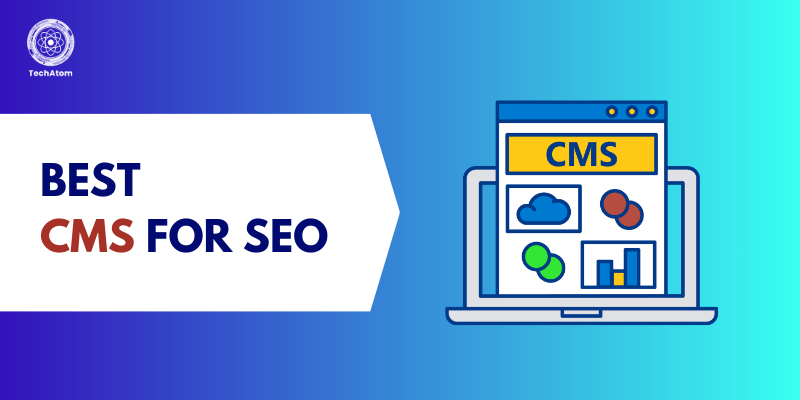Most organizations hardly consider the fact that their CMS (Content Management System) is crucial for their SEO efforts. It’s not just helpful for design and content, but it can make or break your website’s performance, blog optimization, and user experience—all aspects that are SEO-critical.
In this post, we’ll take a look at the best CMS for SEO that you can use today. But before that, let’s discuss why your CMS needs to be SEO-friendly.
Importance of CMS in SEO
Your CMS might be holding your website back, and it’s important to understand why. An SEO-friendly CMS helps you crawl and index your webpages quickly, which directly helps in ranking. These CMS also provide in-depth options to check your website’s mobile optimization, page speed, and site structure.
On the other hand, a CMS that isn’t designed for SEO will only make your website look good. But in terms of search ranking capability, you’ll have to put in extra effort for the same output. In other words, you’ll have to research and spend capital on multiple third-party software that may or may not integrate with your current CMS.
To avoid this and ensure that you’re set in the long-term SEO game, choose a CMS that provides in-built SEO implementation features.
10 Key Features to Look for in a CMS
Now that you know about the importance of a CMS with SEO tools, let’s take a look at some essential features your CMS needs to have.
- Customizable URLs: If your CMS doesn’t allow you to change or modify your URL slugs, you’ll have to migrate immediately. A clean, keyword-friendly URL is essential for ranking in SERPs, and a lack of modification features can seriously hurt your SEO efforts.
- Meta Title and Description Control: The meta title and description give the first impression of your webpage on the SERPs. Your CMS should allow you to modify these for all pages to help you rank better.
- Mobile Responsiveness: Around 63% of all internet traffic comes from mobile devices. If your CMS doesn’t provide options to check your webpage’s mobile responsiveness, you’re losing significant SEO points.
- Fast Loading Speed: Site speed is often overlooked by SEO professionals. However, it’s an important factor in determining your website’s user-friendliness and rankings. Choose a CMS that helps you optimize webpages for better loading speeds.
- SSL Certificate Integration (HTTPS): Your website’s security gives trust signals to Google, which in turn helps in ranking the pages. The CMS you use should have no issue in adding and managing your SSL certifications.
- SEO Plugin and Extension Support: Not all CMSs provide every SEO tool from the outset. You might have to integrate some plugins or extensions for more niche requirements. This should be supported by your chosen CMS without any hassle.
- Image Optimization Capabilities: Slow-loading images give a bad user experience. Your CMS should allow you to optimize the image format, size, and resolution.
- Structured Data (Schema Markup) Support: Schema markup helps Google’s crawler understand what’s on your page. If your CMS doesn’t allow you to modify this, it can affect your ranking.
- XML Sitemap and Robots.txt Management: Sitemaps are important for search engines to understand your website’s structure and content ecosystem. This also affects crawlability, and therefore is essential in your SEO gameplan.
- Canonical Tags Management: You might come across duplicate URLs on your website. To manage them, you need your CMS to allow modification of canonical tags.
The features we’ve listed here are present in any CMS worth its salt. If the CMS you’re currently using is missing 2-3 of these features, it’s time for a change!
Top CMS Platforms for SEO in 2026
We’ve covered the important SEO features that your CMS needs. To make your job easier, we’ve listed the best CMS that you can use today. These platforms are highly SEO-friendly and used by organizations worldwide for managing their websites.
1. WordPress
Did you know that 43.5% of all websites use WordPress? This makes it one of the most widely used and popular CMS in the world. Why? Because it’s highly SEO-friendly and perfect for beginners. You could run an enterprise site or a niche blog from it, and optimize each and every aspect of your website’s SEO through WordPress’s intuitive dashboard.
Plus, WordPress features important SEO plugins like Yoast and Rank Math, which ensure that your blogs are destined for high rankings.
WordPress Pros
- Excellent SEO implementation features and plugins
- Very easy to use, even for beginners
- Massive marketplace for themes and plugins
- Frequently updated to ensure Google-friendliness
WordPress Cons
- Performance dips if you have too many plugins or webpages
- Security features aren’t as good as some other CMS
2. Optimizely
When it comes to enterprise CMS, you’ll likely find few with the customization capabilities of Optimizely. It works with a headless framework, which means that you can combine it with your frontend systems for optimized performance and a greater level of control.
It’s also replete with AI features to ensure that you can scale your content production quickly. This makes it stand out from other platforms on this list, as it advertises itself as an AI-first CMS.
Optimizely Pros
- Perfect for A/B testing
- Ideal for enterprises that focus on large-scale content, whether external or internal
- Great AI-assisted features
- Excellent built-in analytics tools
Optimizely Cons
- Not meant for beginners
- Costs are too high for smaller businesses
3. Shopify
If you’re running an e-commerce business, you’ll be hard-pressed to find a CMS that’s as good as Shopify. It comes with plenty of core SEO features and e-commerce tools to ensure that your business website both ranks and converts customers.
Websites that are built with the Shopify CMS provide excellent performance, even on mobile devices. Plus, Shopify has excellent SSL integrations to keep your site secure. However, you’ll miss out on advanced SEO customization options.
Shopify Pros
- Built for e-commerce websites
- Great performance on all devices
- Decent core SEO features built-in
Shopify Cons
- Blog SEO features aren’t the most advanced
- Lacks customization features for SEO blogs
4. Drupal
Looking for customizability? Drupal is an open-source CMS that’s perfect for scalability, and offers plenty of customization features. It’s the preferred CMS for complex websites, allowing you to change user permissions, content structure, and so much more.
If you’re an advanced SEO professional, you can use various modules with Drupal, like Pathauto and XML Sitemaps, to organize your website’s content.
Drupal Pros
- Ideal for advanced and technical SEO
- Secure core features
- Great for enterprise requirements
- Offers excellent flexibility to developers
Drupal Cons
- Not meant for beginners
- Updates require the help of developers
5. Joomla
While WordPress is meant for beginners and Drupal for developers, Joomla has perfected the middle ground. It offers more advanced features than WordPress, and packages its advanced features neatly into a developer-friendly interface.
Apart from core SEO features like metadata handling and URL management, you get support for multilingual content. This allows you to extend your reach beyond classic English websites and create content for targeted audiences in different countries.
Joomla Pros
- Very user-friendly, even with its advanced features
- Decent level of customization for SEO
- Supports SEO-based extensions
Joomla Cons
- Customization level isn’t great if you want granular control
- Interface isn’t very accessible for beginners
6. Webflow
We all love beautiful websites, don’t we? While WordPress offers some level of personalization, it’s somewhat limited in terms of design. This is where Webflow comes into the picture.
This is a CMS that also doubles as a visual web design tool. If you’re a developer or designer, you’ll love the design flexibility that it offers. Moreover, just because it focuses on design doesn’t mean it’s not great for SEO. In fact, you can access both core and advanced SEO features like schema markup, HTML/CSS output, and custom URLs!
Now, you won’t have to sacrifice on SEO if you plan on creating a beautiful website.
Webflow Pros
- Excellent design capabilities
- Great SEO customization options
- Works with a global CDN for fast performance
- Can host without integrating with a hosting platform
Webflow Cons
- Learning curve is steeper if you don’t have design experience
- Expensive due to its design capabilities
7. Ghost
If you want a no-nonsense CMS for publishing your blogs and newsletters, Ghost is an extremely viable option. It has a minimalist interface, isn’t bloated with theme plugins, and offers quick performance. It’s got some amazing core SEO features baked-in, such as AMP validation, structured URLs, metadata support, and more!
I’d highly recommend this CMS as a great alternative to WordPress for beginners. If you want simplicity, Ghost is where it’s at!
Ghost Pros
- Minimalist themes that ensure fast performance
- No bloatware to slow down the platform
- Decent SEO features, especially for beginner websites
- Great security features
Ghost Cons
- Doesn’t support too many integrations or plugins
- Not meant for complex sites
8. HubSpot CMS
We all know HubSpot to be one of the greatest marketing tools available today. But did you know that it also comes with its own CMS?
The HubSpot CMS is a part of HubSpot’s complete ecosystem, and it integrates perfectly with HubSpots other tools for content marketing and inbound SEO. This also includes the HubSpot CRM and analytics tools, making the CMS a one-stop shop for all things content.
HubSpot CMS Pros
- Great for enterprises that focus extensively on content marketing
- Built-in SEO optimization options
- Seamless integrations with HubSpot’s other tools
- Superb performance
HubSpot CMS Cons
- Not meant for simpler websites
- Expensive and overkill for small businesses
How to Choose the Right CMS for Your Needs
Your CMS will determine pretty much everything about your website, not just the SEO. So, choosing one for your needs comes down to a few important factors:
- Business Size: Determine your business requirements before opting for a CMS. Most businesses work fine with popular platforms like WordPress. However, if you’re running an enterprise, it’s better to go for Drupal or Webflow, as they offer greater flexibility in design and development. You don’t want to overpay for features that you don’t need!
- Purpose: For simple blogging, WordPress or Ghost work perfectly fine. But if you want to dive deeper into content, especially with content marketing, you need a CMS like HubSpot CMS that allows integration with other tools.
- Technicality: If you’re a beginner, choosing a more developer-friendly CMS like Drupal will lead to steeper learning curves. This can backfire in terms of efficiency. Understand your technical expertise and choose a CMS accordingly. I’d recommend WordPress or Ghost for beginners, as these platforms require little-to-no coding knowledge.
- Price: Of course, your budget will also determine the CMS that you use. If you’re running a small business, you just need to put out content on your website. For this, cheaper CMS like WordPress or open-source platforms are a better option. However, if you have the budget, more expensive platforms like HubSpot CMS and Webflow provide more customization options.
- Security: If your business is online, you need to ensure that your website is secure. Choose a CMS that provides SSL certification for website protection, and has the core security features built in. Using a CMS that lacks important security features can make your website susceptible to cyberattacks.
Conclusion
And with that, we come to the end of our list of the best CMS for SEO. Whether you’re a small business or an enterprise, there are plenty of CMS options available today. However, you’ll have to determine your needs, pricing, and technical skills to choose the one that’s ideal for you. We’ve laid out all the popular CMSes and how you can choose them.
For more informative posts like these, keep an eye out for this space!
People are also reading:
- Top SEO Experts
- Best Keyword Tracking Tools
- Content Marketing Trends
- AI Content Writer vs Human Writer
- Link-Building Strategies
- On-Page SEO Strategies
Frequently Asked Questions
1. Does CMS affect Google ranking?
To some extent, yes. Your chosen CMS affects your Google ranking as these platforms come with SEO optimization and customization features. You can adjust the metadata, URL structure, and add plugins for content optimization as well. These features directly affect your website’s Google ranking.
2. Is Webflow better than WordPress for SEO?
Although Webflow offers some excellent SEO features, we’d still recommend WordPress for SEO due to its content and SEO focus. On the other hand, Webflow is great for designers who don’t want to sacrifice on SEO, but it has a steep learning curve.
3. Can I improve SEO without plugins?
Yes, you can improve SEO without plugins by following SEO best practices in your content. Of course, you’ll still have to ensure that other aspects of SEO, such as URL structure, are optimized based on Google rankings. Many CMS provide built-in SEO features, ensuring that you don’t have to add extra plugins for optimisation.
4. What CMS do SEO experts recommend?
WordPress is still the best option for SEO, according to SEO experts. Its flexibility and integration support for multiple SEO plugins make it an excellent choice for most websites and businesses.
5. Is a paid CMS better for SEO?
A paid CMS will provide more customization flexibility and integration support for SEO. However, many websites with millions of monthly sessions work fine with just WordPress, which is free to use.




